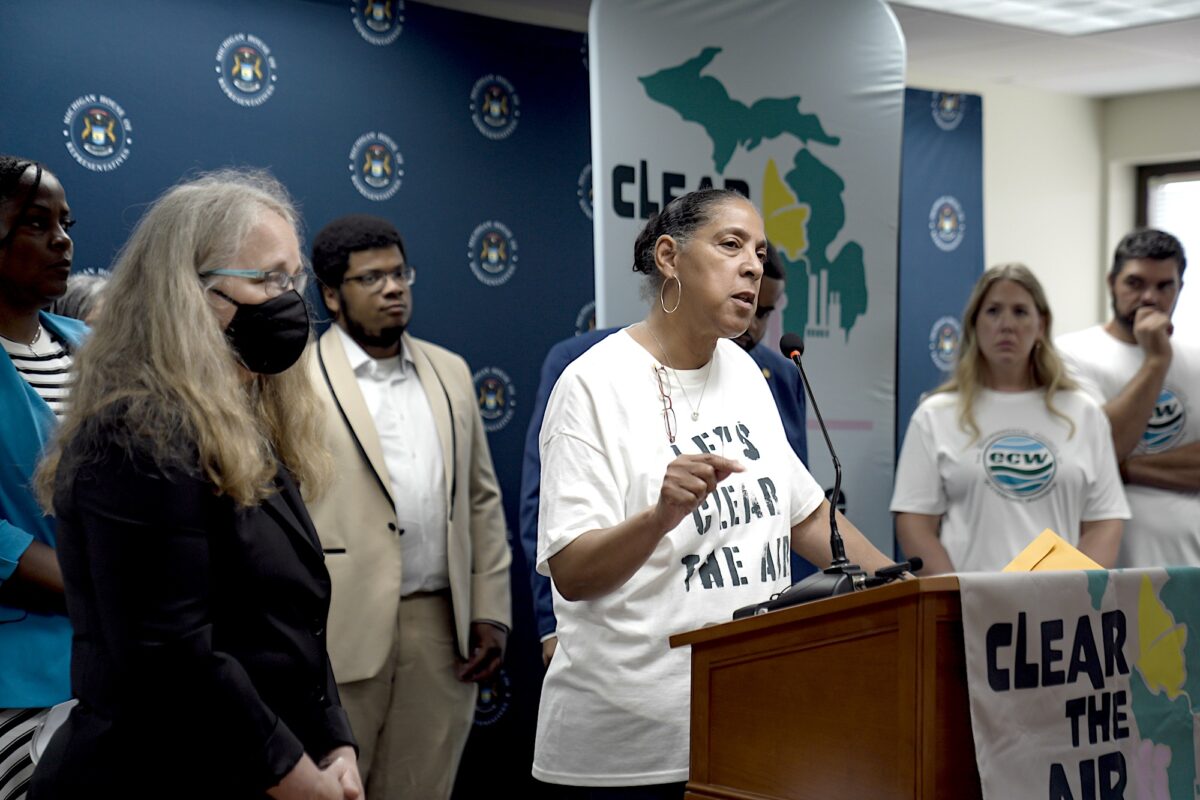Overview:
- Detroit Democrats Rep. Donavan McKinney and Sen. Stephanie Chang are championing the Protecting Overburdened Communities Act.
- This legislation demands that state regulators assess the cumulative health impacts of pollution sources.
- McKinney, reflecting on personal experiences with asthma, emphasizes the real-world impact of combined pollution. With eight states already implementing similar laws, Michigan's environmental advocates rally behind Chang and McKinney, underscoring the widespread community implications.
State Rep. Donavan McKinney and Sen. Stephanie Chang, both Detroit Democrats, introduced the Protecting Overburdened Communities Act (SB 479 and HB 4742) this month, which would require state environmental regulators to consider the cumulative health impacts of multiple pollution sources, such as industrial facilities and truck traffic, when reviewing permit applications.
McKinney, who grew up on Detroit’s northeast side, said he and his brother developed asthma at an early age and worries his children may face the same fate.
Michigan’s Department of Environment, Great Lakes, and Energy currently looks at individual pollution sources in isolation when granting air quality permits, McKinney said during a Tuesday press conference.
“But that’s not how it works in the real world,” he said. “As we all know, we do not breathe one source of pollution at a time, and we experience the health harms of all the combined pollution we breathe.”
In a statement, EGLE spokesperson Josef Greenberg said that environmental permitting is governed by a number of state and federal laws.
“Many of EGLE’s permit programs are currently required to consider the effects of multiple sources, ambient conditions, and potential community impacts,” Greenberg said.
Eight states currently have cumulative impact legislation in place, including California, Connecticut, Georgia, Maryland, Minnesota, New Jersey, New York, and North Carolina, according to the Environmental Defense Fund.
Former state Rep. Abraham Aiyash (D-Hamtramck) introduced an earlier version of Chang and McKinney’s cumulative impact legislation in 2024. This bill did not pass out of committee.
learn more
What Michigan could learn from New Jersey’s 2020 cumulative impact law
Experts say all Michigan residents could benefit from the transparency in the Garden State’s pollution rules for overburdened communities.
Local advocates aim to make ‘cumulative impact’ a factor in air quality regulation
Advocates are pushing for regulators to consider cumulative impact – the idea the totality of environmental threats affecting a community should be considered in permitting decisions – which is not typically how environmental permitting decisions are handled today.
New bill would help protect overburdened Michigan communities from further pollution
New legislation to improve environmental justice could block permits for polluters in parts of Michigan where heavy industry is concentrated, such as the east side of Detroit or the city’s 48217 ZIP code. In July, State Rep. Abraham Aiyash (D-Hamtramck) introduced HB 5901, the Protecting Overburdened Communities Act, to prevent companies from obtaining permits for new facilities…
Cumulative air pollution impacts threaten Michigan statewide
Environmental groups joined Chang and McKinney to announce the legislation, noting that the issue impacts communities across the state.
“Clean air isn’t just a downstate issue, it’s also a northern Michigan issue,” said Deirdre Nieves, director of climate solutions and justice for West Michigan Environmental Action Council, reading from a statement by Kalvin Carter, with Up North Advocacy.
Ontario industrial facilities, wildfires, shipping emissions from freighters passing through the Soo Locks, and traffic on I-75 combine to dirty the air in Sault Ste. Marie, the statement said.
New data centers, plastic recycling facilities, and power plants could increase pollution in rural areas, according to Kathryn Savoie, director of equity and environmental justice with the Ecology Center.
“This law is going to protect all of our communities, and not just urban areas, even though those are the places that are hardest hit right now,” she said.
The legislation comes after the state identified earlier this year that Wayne and Kalamazoo counties will fail to meet new federal air quality standards for fine particulate matter (PM2.5). Michigan has recommended that those counties be redesignated as nonattainment areas under the Clean Air Act, which could lead to stricter pollution controls.
Meanwhile, federal rollbacks of clean air protections could add to the threat that overburdened communities face in Michigan, according to advocates, who say new state-level protections are needed to mitigate these impacts.
The Trump administration has moved to roll back federal air quality rules for power plants, vehicles, and other pollution sources, and DTE Energy’s EES Coke on Zug Island has sought an exemption from Clean Air Act rules.
“There’s nothing we can do at the state level that will completely eliminate that real harm,” said Chris Gilmer-Hill, policy associate at the Michigan Environmental Justice Coalition. “But we do have a lot of power at the state level to at least say no to pollution here.”





